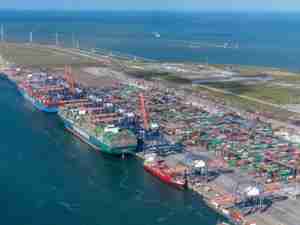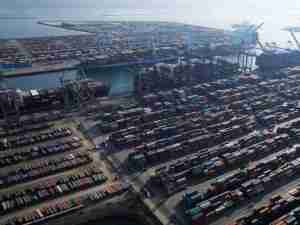The transport woes also hit cargo operations, adding another dimension to the storm's economic toll.
New York closed seven major bridges, including the George Washington Bridge and the Verrazano-Narrows Bridge.
"With storm gusts up to 80-85 mph, the bridges in the NYC area are unsafe," Governor Andrew Cuomo's office said in a statement.
New Jersey's Garden State Parkway, which has been ranked among the busiest U.S. toll roads, was closed in both directions along its southern 63 miles because of flooding.
Massive cargo container operations in New York and New Jersey shut down, and will stay closed indefinitely, the port authority said, stranding millions of dollars worth of goods arriving for the holiday season.
The cost of the cargo disruptions probably won't be large, said Arthur Hatfield, managing director of equity Research at Raymond James in Memphis, Tenn. While cargo gets backed up it eventually gets delivered. "Nothing disappears," he said.
"The only time we've ever seen a storm that had a lasting or immediate impact on logistics and or freight volumes was Katrina," he added. Sandy is a Category 1 hurricane, he noted. "You've got to remember Katrina was a Category 5 and the storm surge was something they'd never seen." Katrina weakened to a Category 3 by landfall.
Ryder System Inc, a truck rental and supply chain management company, said it closed distribution centers along the east coast that serve auto, electronics and other industries, but said the extent of the disruptions would not be known for a while.
Similarly, trucking company YRC Worldwide was shut operations in the Northeast corridor.
"This has been a huge storm -- much bigger than Irene," said Mitch Lilly, Senior VP Operations for YRC, referring to the 2011 storm that made landfall in New Jersey.
CSX Corp the nation's second-largest publicly owned railroad company, shut its network between Richmond, Va., and Albany, N.Y.,. The closure included Boston and extended as far west as Brunswick, Md.
Norfolk Southern Corp said rail traffic from Virginia through New England could be affected by flooding and high winds, and told customers to expect delays of at least 72 hours.
Some freight companies said they would keep working where it was possible. "We're going to be doing operations as long as we possibly can, as far as pickup and delivery goes," said Chris Stanley, spokesman for FedEx Corp, the second-largest package delivery company in the U.S. "If we are able to safely move, we will."
United Parcel Service Inc began rerouting packages and airplanes over the weekend. It suspended delivery in Delaware, Maryland and Washington, D.C., but dispatched delivery trucks in Manhattan, Connecticut, Westchester County, Nassau County and Suffolk County.
In New Jersey, UPS has sent out about half of its drivers, and most drivers have been working in New England. Operations were normal in Pittsburgh, central Pennsylvania, West Virginia and Virginia, except along the coast. UPS said it was planning for significant snow in some areas.
It's "too soon to put any dollars around impacts or to look at any specific sectors," said Susan Rosenberg, a spokeswoman for UPS.
Flights Canceled
Airlines canceled more than 13,700 flights, Flight-tracking service FlightAware said.
The tracking service said Philadelphia's airport was the hardest hit, with 1,259 cancellations. The service said the three New York area airports have so far each canceled about 1,100 flights.
New York and Washington, D.C., area airports remained open even though flights have been canceled.
The Federal Aviation Authority said that air traffic control towers were closed at regional airports: Hartford-Brainard and Groton-New London in Connecticut; Northeast Philadelphia in Pennsyl










